英语句子分类
英语句子分类

句子分类一,主语+系动词+表语The lesson was interesting.The damage appears serious.The soup tastes delicious.The actors got ready.The milk went sour.The cinemas remained open all week.To go further was impossible.=It was impossible to go further.二,主语+谓语1, S+ Vi+ adv.A tiger has got out.A visitor came in.The noise fades away.The house has warmed up.2, S + Vi + noun./prep. PhraseThe book cost ten dollarsThe room measures 10 meters across.The meeting lasted (for) three hours.The sea front extends (for) 3 miles.3, S +Vi + to doJane hesitated to phone the office.We all longed to get away for a family holiday.三,主语+ 谓语+宾语4, S + Vt + noun./pronoun.Gorge was watching TV.The company paid a sum of money.Peter doesn’t owe anything.A small boy opened the door.5, S + Vt + O. +adv.Bill has a blue shirt on.The frost has killed the buds off.The nurse shook the medicine up.Sally is tidying her room up.6, S +Vt + that clause.The weatherman forecast that more snow is on the way. We considered that Franklin has been badly treated.7, S + Vt +wh- clause.The class doesn’t know what time it has to be in school.The students haven’t learnt which tutors they can rely on.Bill discovered who he had to give the money to.We havenot decided what we ought to do next.8, S + Vt +to doTom loved to do the household chores.Bill liked to arrive early for meetings.Mary hates to drive in the rush hour.The teacher failed to produce useful results.Jane wants to finish the job by tomorrow.Peter expected to be promoted soon.9, S + Vt + doing sth.Peter enjoys playing football.John prefers walking to the office.The airline will finish operating next year.The children started crying suddenly.四,主语+ 谓语+宾语+宾语补足语10,S + 复合Vt + O. + OC.The teacher referred the class to a passage.The waiter served Sarah with a double helping.The lecturer confused your name with mine.The visiting speakers thanked the chairman for his kind remarks. 11, S + 复合Vt + noun/pronoun +to doTony prefers his wife/her to do the work.The boss liked the staff/them to arrive early for work.Julie hates her husband/him to lose his temper.The teacher wants her class to finish the job on time.12, S + Vt + O. + doing sth.I don’t like John interrupting all the time.Jill hates her husband coming home late.Our parents dislike our working late.13,We watched the man destroying the furniture.The porter heard someone slamming the door.The children saw the cat stealing the meat.14,We watched the man destroy the furniture.The porter heard someone destroy the furniture. The children saw the cat steal the meat.15,I imagined him much taller than that.Jane prefers her coffee black.Peter has a tooth lose.The fridge keeps the beer cool.The mayor declared the meeting open.16,We made Frank chairman.We declared Jones the winner.The court considered Mr. Smiths a trustworthy man. The police didn’t accept the story as genuine.The club won’t appoint a teenager as the leader. 17,The reporter pressed her to answer the question. The thief forced Jane to hand over the money.The extra money helped John to be independent.An official declared the place to be free of infection. 18,This remark set everyone thinking.The look on Bill’s face had me trembling with fear. The policeman got the traffic moving.The driver kept his engine running.19,His tutor made him work.Mother won’t let the children play in the road. Stephen helped us organize the party.五,主语+ 谓语+双宾语20,The queen awarded the pilot a gallantry medal.The waiter poured Sarah a glass of water.Henry taught the children French. Christina will lend us her flat.I will make everyone some fresh coffee.21,The queen awarded the medal to the pilot.The waiter poured a glass of water for Sarah.Henry taught French to the children.Christina will lend the flat to us.I will make some fresh coffee for everyone.22,Colleagues told Paul that the job wouldn’t be easy.The manager informed the audience that the show had been cancelled.Police warned the driver that the roads were icy.23The employers announced to the journalists that the dispute had been settled.The consultant recommended to the employers that the salary scale should be introduced. The garage explained to the customers that the small parts had been delivered..24,A friendly guard showed the prisoner how he would escape/how to escape/.The porter reminded guest where they should leave the luggage/where to leave the luggage. Experience hasn’t taught Martha whom she can trust/ who to trust.25,We explained to the staff how they should handle complaints/ how to handle complaints. 26,We told peter to see a doctor.His teacher advised him to learn music.The court forbade the father to see his children.27,She gestured to the children to stand up.Stephen shouted to the waiter to bring another chair.A police motioned (示意) to us to move to the roadside.。
英语句子分类

英语结构由简单句和非简单句组成
简单句分为五大基本句型和四大成分:
五大基本句型包括:主+谓、主+谓+宾、主+谓+双宾、主+谓+宾+宾补、主+系+表;
四种成分为定语、状语、同位语和插入语。
非简单句分:并列句和复合句
并列句包括:句中并列和句间并列;
复合句是三大从句:名词性从句、形容词性从句和副词性从句;
名词性从句包括:主语从句、宾语从句、表语从句、同位语从句;
形容词性从句包括:限定性定语从句和非限定性定语从句;
副词性从此即为状语从句(时间、地点、原因、目的、结果、条件、让步、比较和方式);注:状语还包括伴随状语和独立主格结构
外加倒装、省略和强调,这三种特殊的语言现象构成整个英语结构的全部。
(完整word版)英语句子类型讲解及练习
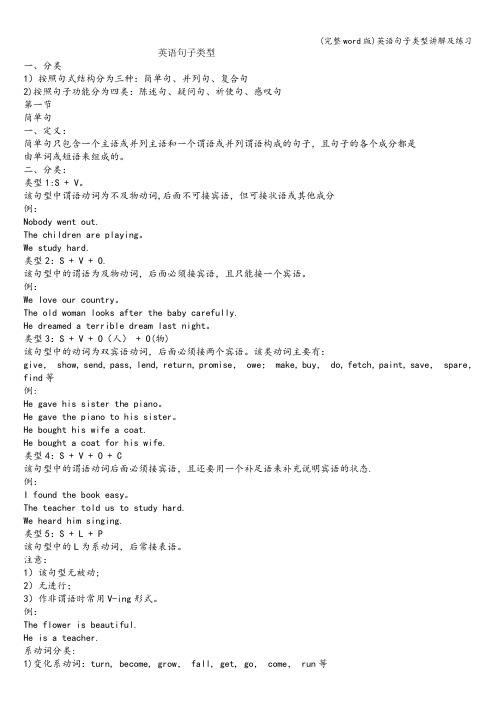
英语句子类型一、分类1)按照句式结构分为三种:简单句、并列句、复合句2)按照句子功能分为四类:陈述句、疑问句、祈使句、感叹句第一节简单句一、定义:简单句只包含一个主语或并列主语和一个谓语或并列谓语构成的句子,且句子的各个成分都是由单词或短语来组成的。
二、分类:类型1:S + V。
该句型中谓语动词为不及物动词,后面不可接宾语,但可接状语或其他成分例:Nobody went out.The children are playing。
We study hard.类型2:S + V + O.该句型中的谓语为及物动词,后面必须接宾语,且只能接一个宾语。
例:We love our country。
The old woman looks after the baby carefully.He dreamed a terrible dream last night。
类型3:S + V + O(人) + O(物)该句型中的动词为双宾语动词,后面必须接两个宾语。
该类动词主要有:give, show, send, pass, lend, return, promise, owe; make, buy, do, fetch, paint, save, spare,find等例:He gave his sister the piano。
He gave the piano to his sister。
He bought his wife a coat.He bought a coat for his wife.类型4:S + V + O + C该句型中的谓语动词后面必须接宾语,且还要用一个补足语来补充说明宾语的状态.例:I found the book easy。
The teacher told us to study hard.We heard him singing.类型5:S + L + P该句型中的L为系动词,后常接表语。
英语句子有哪几种类型英语句子的分类PPT英语句子的种类和例句ppt[可编辑]
![英语句子有哪几种类型英语句子的分类PPT英语句子的种类和例句ppt[可编辑]](https://img.taocdn.com/s3/m/4d6ab4b181c758f5f71f671e.png)
--- No , I haven ’ t.
2)特殊疑问句
1.特殊疑问句的定义 ; 以特殊疑问词开头,对句中某一成分提问的 句子叫特殊疑问句。
常用的疑问词有: what who whom whose which when where how why 等。
英语句子的种类和例句
【最新 / 精品】
? 一、句子种类两种分类法 ? ( 一 )、按句子的用途可分四种: ? 1 、陈述句(肯定、否定):
? He is six years old; ? She didn ’ t hear of you before.
? 2 、疑问句(一般、特殊、选择、反意):
? Do they like skating? ? How old is he? ? Is he six or seven years old? ? Mary can swim, can ’ t shl, boys; ? Don’ t talk in class
? 4 、感叹句: How clever the boy is!
1 、陈述句 说明一个事实或陈述一个看法,有肯 定式和否定式,语序是主语在前,谓语在后。
She arrived early. She can not have arrived now. 注: 1 )半否定句 I hardly know anything about it.
2、 疑问句
( 1 )疑问句的主要交际功能是提出问题,询问 情况。
(2) 、疑问句 的分类
分为一般疑问句、选择疑问句、特殊疑问句和反 意疑问句。
1 )一般疑问句 用来询问一件事,答案通常是 yes 或 no ,注意语序。
英语几大句型
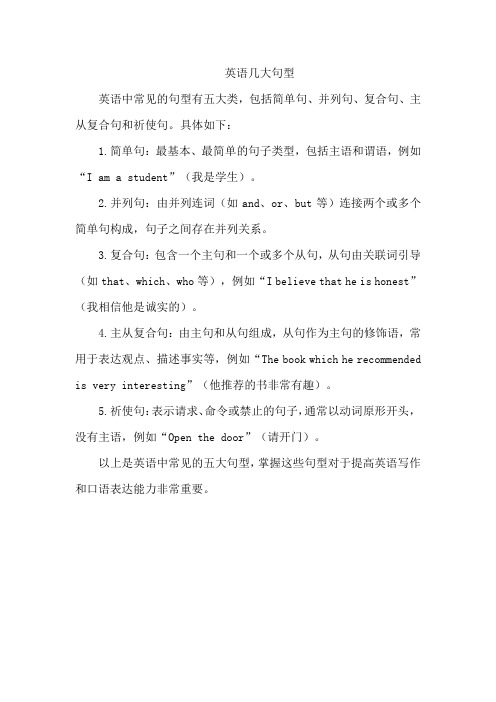
英语几大句型
英语中常见的句型有五大类,包括简单句、并列句、复合句、主从复合句和祈使句。
具体如下:
1.简单句:最基本、最简单的句子类型,包括主语和谓语,例如“I am a student”(我是学生)。
2.并列句:由并列连词(如and、or、but等)连接两个或多个简单句构成,句子之间存在并列关系。
3.复合句:包含一个主句和一个或多个从句,从句由关联词引导(如that、which、who等),例如“I believe that he is honest”(我相信他是诚实的)。
4.主从复合句:由主句和从句组成,从句作为主句的修饰语,常用于表达观点、描述事实等,例如“The book which he recommended is very interesting”(他推荐的书非常有趣)。
5.祈使句:表示请求、命令或禁止的句子,通常以动词原形开头,没有主语,例如“Open the door”(请开门)。
以上是英语中常见的五大句型,掌握这些句型对于提高英语写作和口语表达能力非常重要。
英语句型分类

英语五种基本句型列式
如下:
基本句型一:S+V (主subject+谓verb)
基本句型二:S+V+P (主+系+表predicative)
②被动句变为主动句的方法是:先把被动句中by的宾语变为主动句的主语(如被动句中省略了介词by及其宾语,一般可以用 we, you, they等作主语),再把谓语动词改为主动语态(即把be去掉),最后把被动句的主语改为主动句的宾语,主动句的时态与被动句中be的时态一致;
14. You must throw the broken pottery away at once. → The broken pottery must be thrown away at once.
15. Every one should give back his or her library books on time. → Library books should be returned on time.
16. People make great use of computers widely in the world. → Computers are widely used in the world.
【解析】
①主动句变被动句的方法是:首先把主动句的宾语变为被动句的主语,再把谓语动词变为被动语态,最后加上介词by的宾语(有时可省略);
【解析】 spend与take都可以表示"做某事花某人多少时间或金钱"。 spend的主语用某人表示; take的主语用it。即"(Somebody)spend some time (in) doing sth. / on sth."这一句型可换成"It takes / took somebody some time to do sth." 句型。两个句型都可表示"某人花若干时间做某事"。但在转换时,应注意语序的变化,尤其是前一个句型中(in) doing或on sth.,在后一个句型中应改为to do sth.。"spend...doing sth."相当于pay...for, 它们之间可转换使用。
英语句子的结构分类

英语句子的结构分类如果按照句子的结构分类,英文句子可分为三个类别:简单句(Simple Sentence),并列句(Compound Sentence)和复合句(Complex Sentence)。
1)简单句(Simple Sentence)简单句只有一个主谓关系。
句子可能有两个或更多的主语,也可能有两个或更多的谓语,但是句子中的主谓关系只有一个。
例如:China and Chinese people are incredibly progressing in many aspects .(两个主语,一个谓语)中国和中国人民在以非常的速度日益进步。
Computers mean a lot to human beings and are paidmore and more attention by people . (两个谓语,一个主语)计算机对人类社会意味着很多东西,并越来越受到人们的重视。
2) 并列句(Compound Sentence)并列句有两个或两个以上的主谓结构。
这些主谓结构之间的关系是并列的、对等的。
从语法上讲,所谓"并列"、"对等"是指任何一个主谓结构都能独立地表达意思,谁也不从属于谁。
尽管如此,这些主谓结构在意思或逻辑上有一定程度的内在联系。
否则,它们就可能被分别写成简单句,而没有必要写在一起构成并列句了。
在并列句中,要使两个或几个主谓结构(或者说,分句)连接在一起,就要用并列连词。
并列连词用来连接平行对等(即互不从属)的分句。
按其表示的不同意思有下面几种:A. 表示转折意思: but例:Everything in the world is outside you but health belongs to yourself .一切都是身外之物,只用健康属于自己。
B.表示因果关系: so,for例:You'd better take an umbrella with you, for it's going to rain.要下雨了,你最好带把伞。
初中英语语法-句子的种类

三、疑问句
定义:疑问句用于提出问题。句末用问号(?); 分类:一般疑问句、选择疑问句、反意疑问句和特殊疑问句。 1.一般疑问句是可用Yes 或No 来回答的问句。 它总是以be(is,am,are,was,were),have(has,had),情态动词或助动词开头。 有时也可用“Not at all”,“Certainly”等回答。 —Would you like some more? 你想再来一些吗? —No,thanks. I'm full. 不,谢谢。我饱了。 2.选择疑问句的结构有两种:(1)以一般疑问句为基础,用 or 来连接不同的选择对象; (2)以特殊疑问句为基础,在其后用or来连接不同的选择对象。 Shall we go to see you or will you come to see us?是我们去看你们,还是你们来看我们? Which would you like better, tea or milk?你喜欢喝哪个,茶还是牛奶?
三、疑问句
3.反意疑问句是提出情况或看法,问对方是否同意的句子。 一般由两部分组成:“陈述句+简略问句?”这两部分的肯定与否定形式正好相反, 即:①“肯定的陈述句+否定的简略问句?”②“否定的陈述句+肯定的简略问句?” (1)反意疑问句主语及谓语的确定。 反意疑问句主语与谓语的确定应以陈述部分的主语和谓语为依据,尤其是要注意一些特殊的 情况,同时,简略问句部分的主语一般应用人称代词,而动词若为否定形式则一般应用缩略 形式。 ①陈述部分含有never,few,little,nothing,nobody,no,hardly,none,too...to...等表示否定 意义的词时,其附加问句应用肯定形式。但否定意义的词是careless,dislike等含否定词缀的派 生词时,仍按肯定句对待,后边的简略问句用否定形式。 There are few people in the room, are there?房间里几乎没有人,是吗? ②陈述句部分是“there be”结构时,疑问部分用“be there”。 There is a tree in front of the building, isn‘t there?楼前面有一棵树,是吗? ③当陈述部分的主语为指事(物)的不定代词something,anything,everything等时,附加问句的 主语应用it。 Something is wrong with your computer,isn‘t it?你的电脑出毛病了,是吗?
英语句子的分类
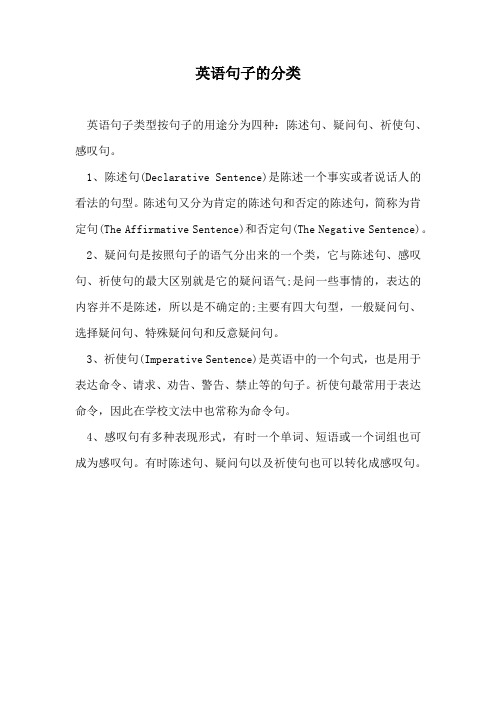
英语句子的分类
英语句子类型按句子的用途分为四种:陈述句、疑问句、祈使句、感叹句。
1、陈述句(Declarative Sentence)是陈述一个事实或者说话人的看法的句型。
陈述句又分为肯定的陈述句和否定的陈述句,简称为肯定句(The Affirmative Sentence)和否定句(The Negative Sentence)。
2、疑问句是按照句子的语气分出来的一个类,它与陈述句、感叹句、祈使句的最大区别就是它的疑问语气;是问一些事情的,表达的内容并不是陈述,所以是不确定的;主要有四大句型,一般疑问句、选择疑问句、特殊疑问句和反意疑问句。
3、祈使句(Imperative Sentence)是英语中的一个句式,也是用于表达命令、请求、劝告、警告、禁止等的句子。
祈使句最常用于表达命令,因此在学校文法中也常称为命令句。
4、感叹句有多种表现形式,有时一个单词、短语或一个词组也可成为感叹句。
有时陈述句、疑问句以及祈使句也可以转化成感叹句。
英语中的句子分类
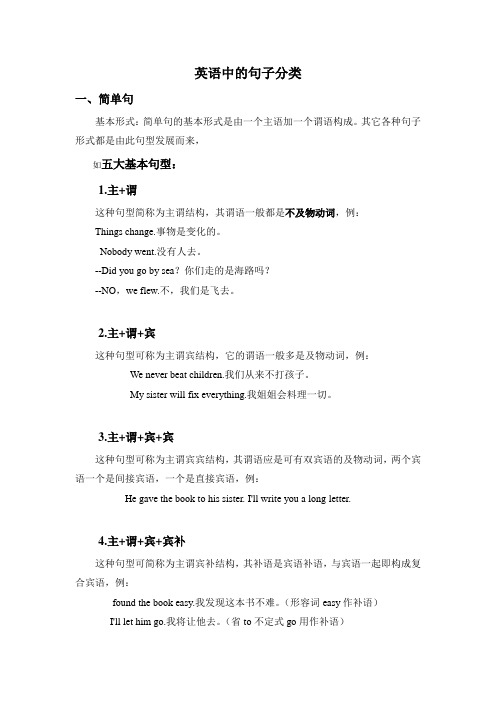
英语中的句子分类一、简单句基本形式:简单句的基本形式是由一个主语加一个谓语构成。
其它各种句子形式都是由此句型发展而来,如五大基本句型:1.主+谓这种句型简称为主谓结构,其谓语一般都是不及物动词,例:Things change.事物是变化的。
Nobody went.没有人去。
--Did you go by sea?你们走的是海路吗?--NO,we flew.不,我们是飞去。
2.主+谓+宾这种句型可称为主谓宾结构,它的谓语一般多是及物动词,例:We never beat children.我们从来不打孩子。
My sister will fix everything.我姐姐会料理一切。
3.主+谓+宾+宾这种句型可称为主谓宾宾结构,其谓语应是可有双宾语的及物动词,两个宾语一个是间接宾语,一个是直接宾语,例:He gave the book to his sister. I'll write you a long letter.4.主+谓+宾+宾补这种句型可简称为主谓宾补结构,其补语是宾语补语,与宾语一起即构成复合宾语,例:found the book easy.我发现这本书不难。
(形容词easy作补语)I'll let him go.我将让他去。
(省to不定式go用作补语)注意:有时两个或更多的并列主语拥有一个共同的谓语,甚至并列有两个主语和两个谓语,这样的句子仍然是简单句,例:China and other countries in the east Asia are developing rapidly.中国和东亚其它国家正在迅速地发展。
(China and other countries并列主语)Mr. Wang and I often work together and help each other.王先生和我常在一起工作互相帮助。
5.主+联系动词+表这种句型称为主系表结构,其实联系动词在形式上也是一种谓语动词,但实质上表语成了谓语,例:Mr. Turner is an artist.特纳先生是位画家。
(三)英语句子种类

• 句子种类两种分类法 1、按句子的用途可分四种: 1)陈述句:用于陈述事实或阐明观点的句子。 词序:“主语+谓语动词”或“主语+系动词+表 语” 肯定结构:(谓语动词不含有否定词) He is six years old. 否定结构:将not置于第一个助动词或情态动词之 后;一般现在时和一般过去时谓语动词不含有 助动词,则在动词前加do(does)或did再加 not。 She didn’t hear of you before.
(三)复合句:主句+从句
主句是一个完整的句子(independent sentence),它可以独立存在。
从句是一个不完整的句子,它必须和 一个主句连用,不能独立存在.
请指出该复合句的主句和从句:
By the time he arrived, 1 主句 we had already left. 2
(二)并列句(compound sentence):
把两个或几个简单句用
并列连词或分号连
接起来,则成为一个并列 句。
常用并列连词
and, both….and…., not only…. but also…., 平行并列连词: neither…. nor…. 转折并列连词: but,while,yet
主语从句
As is known to all, the 2008 Olympic Games will be held in about four months.
定语从 句
I want to live in a place where the air is fresh.
定语从句
I want to live where the air is fresh.
初中英语知识归纳总结——句子的分类
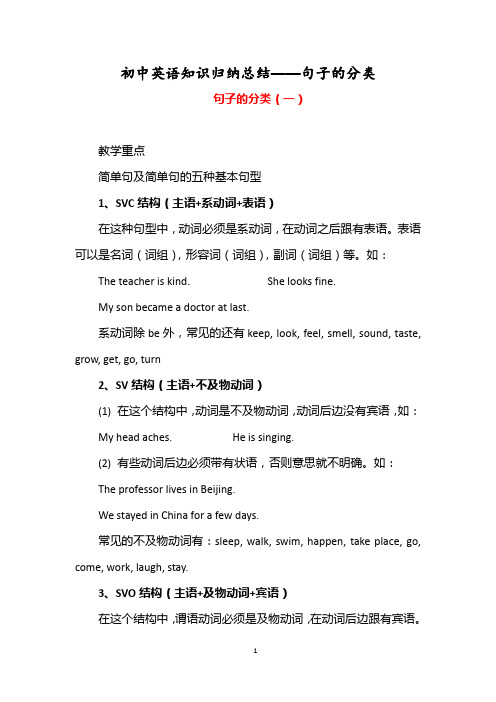
初中英语知识归纳总结——句子的分类句子的分类(一)教学重点简单句及简单句的五种基本句型1、SVC结构(主语+系动词+表语)在这种句型中,动词必须是系动词,在动词之后跟有表语。
表语可以是名词(词组),形容词(词组),副词(词组)等。
如:The teacher is kind.She looks fine.My son became a doctor at last.系动词除be外,常见的还有keep, look, feel, smell, sound, taste, grow, get, go, turn2、SV结构(主语+不及物动词)(1) 在这个结构中,动词是不及物动词,动词后边没有宾语,如:My head aches.He is singing.(2) 有些动词后边必须带有状语,否则意思就不明确。
如:The professor lives in Beijing.We stayed in China for a few days.常见的不及物动词有:sleep, walk, swim, happen, take place, go, come, work, laugh, stay.3、SVO结构(主语+及物动词+宾语)在这个结构中,谓语动词必须是及物动词,在动词后边跟有宾语。
He can drive a car.They speak English.有些不及物动词后面加上介词或副词可以把它看成一个及物动词,这时后边可接宾语。
Please listen to me carefully.4、SVOO结构(主语+动词+间接宾语+直接宾语)(1) 双宾语结构在这个结构中,动词是带有双宾语(直接宾语和间接宾语)的及物动词。
直接宾语多指物,间接宾语多指人。
常用的带有双宾语的动词有:give, send, tell, bring, lend, buy, teach, get, call, do, ask, wish, offer等。
英语的句子分类范文
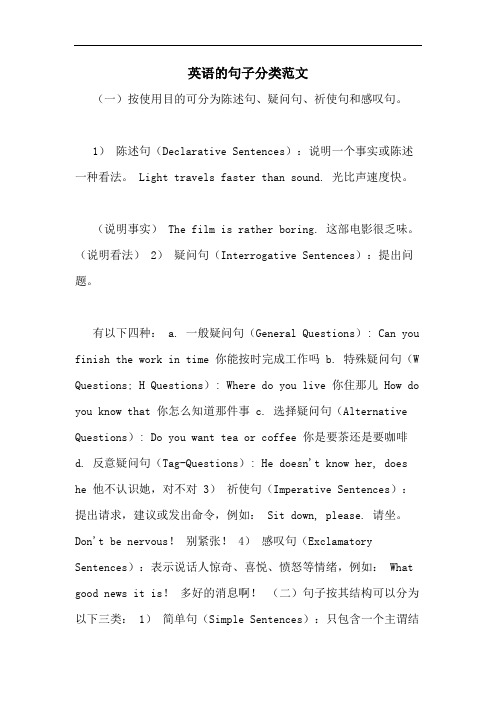
英语的句子分类范文(一)按使用目的可分为陈述句、疑问句、祈使句和感叹句。
1)陈述句(Declarative Sentences):说明一个事实或陈述一种看法。
Light travels faster than sound. 光比声速度快。
(说明事实) The film is rather boring. 这部电影很乏味。
(说明看法) 2)疑问句(Interrogative Sentences):提出问题。
有以下四种: a. 一般疑问句(General Questions): Can you finish the work in time 你能按时完成工作吗 b. 特殊疑问句(W Questions; H Questions): Where do you live 你住那儿 How do you know that 你怎么知道那件事 c. 选择疑问句(Alternative Questions): Do you want tea or coffee 你是要茶还是要咖啡d. 反意疑问句(Tag-Questions): He doesn't know her, does he 他不认识她,对不对 3)祈使句(Imperative Sentences):提出请求,建议或发出命令,例如: Sit down, please. 请坐。
Don't be nervous!别紧张! 4)感叹句(Exclamatory Sentences):表示说话人惊奇、喜悦、愤怒等情绪,例如: What good news it is!多好的消息啊!(二)句子按其结构可以分为以下三类: 1)简单句(Simple Sentences):只包含一个主谓结构句子叫简单句,例如: She is fond of collecting stamps. 她喜欢集邮。
(主)(谓) 2)并列句(Compound Sentences):包含两个或两个以上主谓结构的句子叫并列句,句与句之间通常用并列连词或分号来连接,例如: The food was good, but he had little appetite. (主)(谓)(主)(谓)食物很精美,但他却没什么胃口。
英语句子分类(附练习答案)
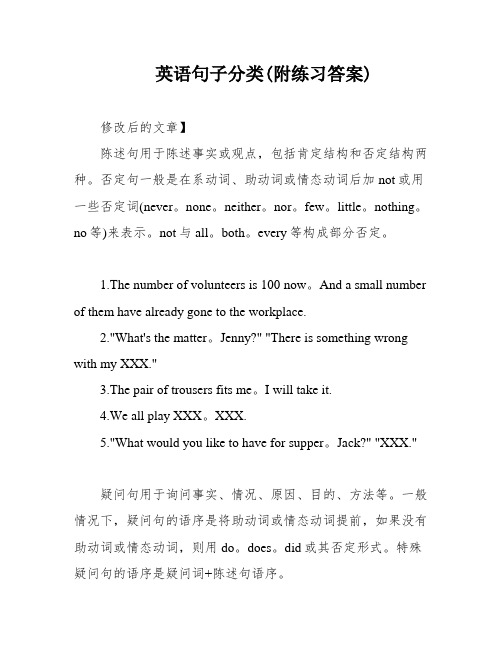
英语句子分类(附练习答案)修改后的文章】陈述句用于陈述事实或观点,包括肯定结构和否定结构两种。
否定句一般是在系动词、助动词或情态动词后加not或用一些否定词(never。
none。
neither。
nor。
few。
little。
nothing。
no等)来表示。
not与all。
both。
every等构成部分否定。
1.The number of volunteers is 100 now。
And a small number of them have already gone to the workplace.2."What's the matter。
Jenny?" "There is something wrong with my XXX."3.The pair of trousers fits me。
I will take it.4.We all play XXX。
XXX.5."What would you like to have for supper。
Jack?" "XXX."疑问句用于询问事实、情况、原因、目的、方法等。
一般情况下,疑问句的语序是将助动词或情态动词提前,如果没有助动词或情态动词,则用do。
does。
did或其否定形式。
特殊疑问句的语序是疑问词+陈述句语序。
1."Is the girl in red your friend?" "No。
she is learning Chinese now."2."When will the match een HAS and BIG be held?" "In our school stadium."3.How often do you volunteer in the Old People's Home。
英语句子的种类

Does he love her.
Tom has done his work. Has Tom done his work. Tom can ride bike. Can Tom ride bike.
1. 2.
1. 2.
陈述句如何变特殊疑问句
1. 2. 3. 4. 5.
or, otherwise ,either…or
3.复合句:主句+从句 主句是一个完整的句子(independent sentence),它可以独立存在。
从句是一个不完整的句子,它必须和一个 主句连用,不能独立存在.
在复合句中,主要包含以下类型从句: 1.主语从句 2.宾语从句
3.表语从句
5.状语从句
2.并列句(compound sentence):
把两个几个简单句
用并列连词连接起来, 则成为一个并列句。
常用并列连词
平行并列连词:
转折并列连词:
因果并列连词: 选择并列连词:
and, both…and, not only… but also, neither…nor but, however, while, yet, when for, so, therefore
6.
结尾将“. ”变成“?”。
注:涉及到第一人称和第二人称时,疑问句中的人称应与陈述句的人称相反。 对主语进行提问直接将疑问词替代主语,对谓语提问时将谓语动词变为do
陈述句如何变一般疑问句
1.
2. 3.
He loves her.
Whom do he loves?
插入
Whom does he love.
确定提问部分所对应的疑问词,将该部分替代为疑问词放在句首; 查看陈述句中是否有情态动词,如果有将情态动词移到疑问词的后面; 查看陈述句中是否有助动词,如果有将情助动词移到疑问词的后面;
高考英语:英语中句子种类的划分变换
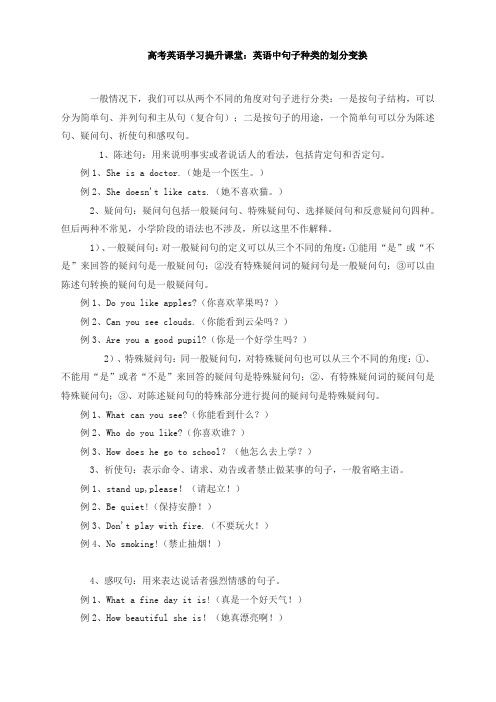
高考英语学习提升课堂:英语中句子种类的划分变换一般情况下,我们可以从两个不同的角度对句子进行分类:一是按句子结构,可以分为简单句、并列句和主从句(复合句);二是按句子的用途,一个简单句可以分为陈述句、疑问句、祈使句和感叹句。
1、陈述句:用来说明事实或者说话人的看法,包括肯定句和否定句。
例1、She is a doctor.(她是一个医生。
)例2、She doesn't like cats.(她不喜欢猫。
)2、疑问句:疑问句包括一般疑问句、特殊疑问句、选择疑问句和反意疑问句四种。
但后两种不常见,小学阶段的语法也不涉及,所以这里不作解释。
1)、一般疑问句:对一般疑问句的定义可以从三个不同的角度:①能用“是”或“不是”来回答的疑问句是一般疑问句;②没有特殊疑问词的疑问句是一般疑问句;③可以由陈述句转换的疑问句是一般疑问句。
例1、Do you like apples?(你喜欢苹果吗?)例2、Can you see clouds.(你能看到云朵吗?)例3、Are you a good pupil?(你是一个好学生吗?)2)、特殊疑问句:同一般疑问句,对特殊疑问句也可以从三个不同的角度:①、不能用“是”或者“不是”来回答的疑问句是特殊疑问句;②、有特殊疑问词的疑问句是特殊疑问句;③、对陈述疑问句的特殊部分进行提问的疑问句是特殊疑问句。
例1、What can you see?(你能看到什么?)例2、Who do you like?(你喜欢谁?)例3、How does he go to school?(他怎么去上学?)3、祈使句:表示命令、请求、劝告或者禁止做某事的句子,一般省略主语。
例1、stand up,please!(请起立!)例2、Be quiet!(保持安静!)例3、Don't play with fire.(不要玩火!)例4、No smoking!(禁止抽烟!)4、感叹句:用来表达说话者强烈情感的句子。
英语句子类型

句子成份练习
1、You should study hard. 状语
2、The teacher got very angry. 表语 3、The boy told me his story. 间语+直宾 4、We elected him our monitor. 宾语+宾补 5、The sun keeps us warm. 宾语+宾补 6、I told him to open the window. 宾语+宾补 7、We watched the train leaving the
主+及物动+宾+宾补
4. 刚才她给了我一些墨水。 Just now she gave me some ink. 主+及物动+间宾+直宾
1. Give me one more minute ____ I’ll be able to finish it.
A. and B. or C. if D. so
writing, in order to better
understand my lessons.
简单句的五种基本句型:
一、主语+不及物动词
Spring is coming. This factory opened in 1989.
二、主语+及物动词+宾语 She has bought a new house.
• The house is big. • You are students. • Two is the second number.
• 谓语:用来说明主语做了什么动作或处 在什么状态。谓语一般是动词,放在主 语的后面。(有时态、人称等变化)
• We come to school five days a week.
英语句子结构语法 详细分类
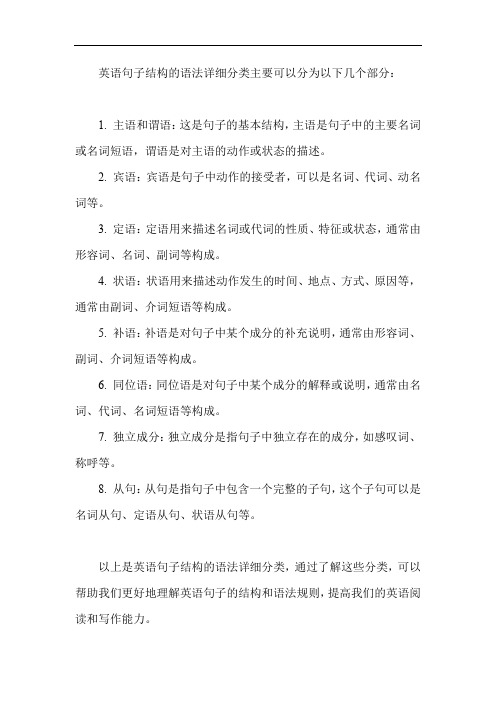
英语句子结构的语法详细分类主要可以分为以下几个部分:
1. 主语和谓语:这是句子的基本结构,主语是句子中的主要名词或名词短语,谓语是对主语的动作或状态的描述。
2. 宾语:宾语是句子中动作的接受者,可以是名词、代词、动名词等。
3. 定语:定语用来描述名词或代词的性质、特征或状态,通常由形容词、名词、副词等构成。
4. 状语:状语用来描述动作发生的时间、地点、方式、原因等,通常由副词、介词短语等构成。
5. 补语:补语是对句子中某个成分的补充说明,通常由形容词、副词、介词短语等构成。
6. 同位语:同位语是对句子中某个成分的解释或说明,通常由名词、代词、名词短语等构成。
7. 独立成分:独立成分是指句子中独立存在的成分,如感叹词、称呼等。
8. 从句:从句是指句子中包含一个完整的子句,这个子句可以是名词从句、定语从句、状语从句等。
以上是英语句子结构的语法详细分类,通过了解这些分类,可以帮助我们更好地理解英语句子的结构和语法规则,提高我们的英语阅读和写作能力。
英语按句子结构分类
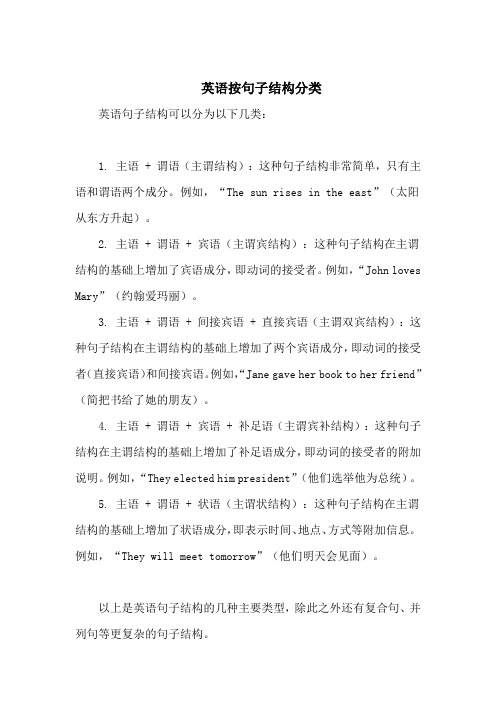
英语按句子结构分类
英语句子结构可以分为以下几类:
1. 主语 + 谓语(主谓结构):这种句子结构非常简单,只有主语和谓语两个成分。
例如,“The sun rises in the east”(太阳从东方升起)。
2. 主语 + 谓语 + 宾语(主谓宾结构):这种句子结构在主谓结构的基础上增加了宾语成分,即动词的接受者。
例如,“John loves Mary”(约翰爱玛丽)。
3. 主语 + 谓语 + 间接宾语 + 直接宾语(主谓双宾结构):这种句子结构在主谓结构的基础上增加了两个宾语成分,即动词的接受者(直接宾语)和间接宾语。
例如,“Jane gave her book to her friend”(简把书给了她的朋友)。
4. 主语 + 谓语 + 宾语 + 补足语(主谓宾补结构):这种句子结构在主谓结构的基础上增加了补足语成分,即动词的接受者的附加说明。
例如,“They elected him president”(他们选举他为总统)。
5. 主语 + 谓语 + 状语(主谓状结构):这种句子结构在主谓结构的基础上增加了状语成分,即表示时间、地点、方式等附加信息。
例如,“They will meet tomorrow”(他们明天会见面)。
以上是英语句子结构的几种主要类型,除此之外还有复合句、并列句等更复杂的句子结构。
- 1、下载文档前请自行甄别文档内容的完整性,平台不提供额外的编辑、内容补充、找答案等附加服务。
- 2、"仅部分预览"的文档,不可在线预览部分如存在完整性等问题,可反馈申请退款(可完整预览的文档不适用该条件!)。
- 3、如文档侵犯您的权益,请联系客服反馈,我们会尽快为您处理(人工客服工作时间:9:00-18:30)。
句子The Sentences知识要点:句子按使用的目的可分为四类:1、陈述句2、疑问句3、祈使句4、感叹句从结构上看句子可分为三种类型:1、简单句2、并列句3、复合句一、句子的种类(Kinds of Sentences)1、陈述句:(1)肯定句:We love our motherland. 我们热爱祖国。
(2)否定句:They don’t go to work on Sundays. 他们星期日不上班。
说明:叙述或否定一个事实或看法。
2、疑问句:(1)一般疑问句:Are you a worker? 你是个工人吗?Yes, I am. 是的,我是工人。
Haven’t you seen the film? No, I haven’t. 你没看过这部电影吗?没看过。
说明:以一个助动词,情态动词或动词be开始的问句。
回答要用yes或no。
(2)特殊疑问句:Who is the man? 这人是谁?When do you watch TV? 你什么时间看电视?What are they doing now? 他们现在正在干什么?说明:以一个疑问代词或疑问副词开头的句子一般要用倒装句语序(或称为疑问词加一般疑问句)(3)选择疑问句:Do you want tea or coffee? Either will do. 你要茶水还是要咖啡?哪种都行。
Does he learn Japanese or French? He learns French. 他学日语还是学法语?他学法语。
说明:提出两个或两个以上的情况,选择一个作为答案。
(4)反意疑问句:They are going to the airpor t, aren’t they? 他们要去机场,是吗?You haven’t finished your homework, have you? 你没做完作业,是吗?说明:提出情况或看法问对方是否同意。
在陈述句后附加一个简短的疑问句,即前面句子肯定,后为否定;前面句子否定,后为肯定。
He seldom went to bed at ten, did he? 他很少在十点钟上床睡觉?是吗?He knows little Russian, does he? 他几乎不懂俄语,是吗?说明:当陈述句部分含有never, no, hardly, seldom, little等否定意义的副词时,附加问句用肯定形式。
3.祈使句:a.陈述句:Be sure to get there at eight. 八点钟一定要到那儿。
b.否定句:Don’t worry. I’ll help you out. 别担心,我会帮助你的。
说明:表示命令,请求,叮嘱,号召等,谓语动词用原形。
4.感叹句:感叹句通常有what, how引导,表示赞美、惊叹、喜悦、等感情。
what修饰名词,how 修饰形容词,副词或动词,感叹句结构主要有以下几种:掌握它的搭配,即掌握了感叹句的重点。
How +形容词+ a +名词+ 陈述语序。
例如:How clever a boy he is!他是多聪明的孩子!How+形容词或副词+陈述语序。
例如:How lovely the baby is! 小毛头真可爱!What +名词+陈述语序。
例如:What noise they are making! 他们真吵!What +a/an+形容词+名词+陈述语序。
例如:What a clever boy he is!他是多聪明的孩子!What+ 形容词+复数名词+陈述语序。
例如:What wonderful ideas (we have)! 我们的主意真棒!What+ 形容词+不可数名词+陈述语序。
例如:What cold weather it is! 多冷的天!What a clever boy he is!的省略形式为:What a clever boy!what + n.:What great changes we have had these years! 这几年我们有了多么大的变化啊!What a fine day it is! 多好的天呀!how + adj.:How brave he is! 他多么勇敢呀!how + adv. :How hard they are working! 他们工作多努力呀!How time flies! 时间过得多么快呀!How + adj. + a (an) + n.How nice a boy (he is)!=What a nice boy he is! 多么好的孩子啊!说明:表示说话时惊异,喜悦,气忿等情绪。
what修饰名词,how修饰形容词、副词或句子。
二、句子的类型(Types of Sentences)1、简单句的句子的类型:一个主语+一个谓语,例:The girl plays the piano every day. 那女孩每天弹钢琴。
两个主语+一个谓语,例:Tom and I are good friends. 汤姆和我是好朋友。
一个主语+两个谓语,例:He opened the door and left. 他打开门出去了。
两个主语或两个谓语或更多,例:Mr and Mrs Smith went to the market, bought some fruit and visited their friends.史密斯夫妇去市场,买了些水果,并看望了朋友。
结构特殊:只含有一个词或一个词组,例:1Hello! 喂!Help! Help! 救命啊!救命!Many thanks. 万分感谢。
2、简单句的基本句型(The Basic Sentence Patterns)句型结构:(1)主语+不及物动词:S + Vi.,例:Birds fly. 鸟飞They disappeared. 他们消失了。
(2)主+ 连系动词+ 表语:S + V + P,例:She is a university student. 她是一名大学生。
He has become a pilot. 他已成为一名飞行员。
(3)主+ 及物动词+ 宾语:S + Vt + O,例:He likes swimming. 他喜欢游泳。
We help each other. 我们互相帮助。
(4)主+ 及物动词+ 间接宾语+ 直接宾语:S + Vt + O + O,例:I told my friend the good news. 我把好消息告诉了我的朋友。
They sent us a telegram. 他们给我们拍了电报。
(5)主+ 及物动词+ 宾语+ 补语:S + Vt + O + C,例: They named the boy Jack. 他们给孩子起名叫杰克。
I want everything ready by eight o’clock. 我要求一切都要在八点前准备好。
注:S = Subject(主语)Vi=Intransitive Verbs(不及物动词)Vt=Transitive Verb(及物动词)P=Predicative(表语)O=Object (宾语)C=Complement补语重点、难点:否定陈述句要注意下列几点:(1)否定陈述句主要是在肯定句中加not或no (= not a /any) 构成的,除not和no外,用具有否定意义的副词也可构成否定陈述句。
常用的词有hardly, seldom, never, little, scarcely, barely, rarely 等。
(2)其他成分的否定形式有些句子的结构上属于肯定式,但含有否定意义的词,可分以下几种。
否定的主语:Nobody will agree with you. 没人同意你的意见。
None of the students like the novel. 没有学生喜欢这本小说。
No student here studies Russian. 这里没有一个学生学俄语。
否定的宾语:We saw nothing in the darkness. 在黑暗中我们什么都看不见。
He will borrow the book from nobody. 他从谁那都借不来这本书。
You must remember not to be late for class. 你必须记住上课不准迟到。
否定的状语:They came here not by bike but on foot. 他不是骑车来的而是走着来的。
We could find him nowhere. 我们什么地方也找不到他。
(3)不定代词all, both, everyone或everybody用于否定句时,表示部分否定。
All the trees here are not apple trees. ( = Not all the trees here are apple trees. )这里的树并非都是苹果树。
(有的是苹果树,有的不是。
)Both of the sisters are not nurses. ( = Not both of the sisters are nurses.)这姐儿俩并不都是护士。
Everybody can’t do it. (= Not everybody can do it. )并不是人人都能做这件事。
【专项训练】:一、陈述句和疑问句:1、They happy when they hear the news.A.will B.will be C.wereD.don’t2、——“ Is your uncle a driver?”——“.”A.No, but my aunt is B.Yes, but my anut isC.No, he doesn’t D.Yes, he does3、We satisfied with their work.A.don’t B.are not C.won’tD.weren’t being4、He coffee at all. He tea.A.doesn’t like, prefers B.likes, doesn’t preferC.would like, not prefers D.prefers, is not fond of5、She me only twice since last year.A.sees B.was seeing C.has seenD.have seen6、My grandma in the country. Now shein the city.A.used to live, lives B.used to living, livedC.uses to live, is living D.was used to live, lives7、You make such mistakes again.A.should never B.should not alwaysC.would always not D.would not forever8、“Can you drive a car?” “.”A.Yes, and Jim can’t too B.Yes, but Jim can’tC.No, but Jim can, too D.No, but Jim can’t29、“Are you going to the super market?” “ No,.”A.I cycle there B.I walk there C.to the work D.I’ve already been there10、In England tea with milk or sugar in it.A.usually drinks B.is usually drunkC.usually is drunk D.drank usually11、“Is she going to the post office?” “No, .”A.she do esn’t B.she goes by bikeC.to the shops D.she’s on the bike12、Tom like reading at all. Heinterested in playing basketball.A.doesn’t, is B.doesn’t, were C.is, does D.was, is13、When home from work?A.do your parents come B.does your parents comeC.have your parents D.our parents come14、Which of the students the examination?A.not pass B.didn’t pass C.passD.didn’t passed15、They trouble lifting the heavy box.A.didn’t have many B.hadn’t a lot of C.didn’t have much D.haven’t a great deal of16、——“Did you have breakfast this morning?——“.”A.Yes, I had B.Yes, I did C.No, I hadn’t D.No,I didn’t have.17、colour is the cover of the dictionary?A.What B.Which C.How D.Whose18、“does he brush hi s teeth a day?” “Twice.”A.What time B.How long C.WhenD.How many times19、There are many pictures on the wall.do you like best?A.What B.Which oneC.Which of the picture D.Which one picture20、Since when her?A.did you know B.have you knownC.do you know D.you know21、“That ten pound note belongs to me.” “.”A.Yes, it is B.Yes, it belongs C.No it doesn’tD.No, it isn’t22、“Would you rather wait or come back later?” “.”A.I’d rather come back B.Yes, I’d rather not waitC.No, I’d rather wait D.to come back23、“shoes do you take?” “Size 42.”A.Which number B.What numberC.What size D.What24、“is the weather like today?” “ It’s windy.”A.What B.How C.What kindD.Which25、Would you read my composition and correct the mistakes,?A.if have B.if any C.if everD.if not26、is the distance between these two villages?A.How far B.What C.How longD.How much27、do you go to the cinema? Twice a month.A.How many time B.How muchC.How long D.How often28、How it in English?A.you say B.do you speak C.do you sayD.to speak29、is the population of the city?A.How much B.How many C.HowD.What30、did she get this information?A.Whom B.Who C.Where D.What31、does your watch cost? Two hundred yuan.A.How many B.What price C.What D.How expensive32、About do you want to know more?A.Whom B.who C.whichD.what33、——We haven’t heard from Jane for a long time.——What do you suppose to her.A.was happening B.to happenC.has happened D.having happened34、——Have you heard the news about Jim?——No. What ?A.is it B.it is C.are theyD.they are35、——Would you rather go there by train or by air?——.3A.Yes, I would B.No, I wouldn’tC.Yes, by air D.By air36、I go or you go yourself?A.Will…will B.Shall…shall C.Shall…willD.Will…shall37、——Do you think the question easy or not?——.A.Yes, I do B.No, I don’t C.It is easy D.Yes, it’s easy38、Shall we stay at home or to the park?A.to go B.going C.goD.will go39、writer is better known in China, Charles Dickens or Mark Twain?A.Whichever B.Whether C.WhatD.Which40、——was the Nanjing-Changjiang Bridge open to traffic?——It was open to traffic in 1968.A.What B.What time C.How longD.When二、感叹句、祈使句41、from Beijing to London!A.How long way it is B.What a long way it isC.What a long way is it D.How long a way is it42、Oh, John, you gave us!A.How a pleasant surprise B.How pleasant surpriseC.What a pleasant surprise D.What pleasant surprise43、terrible weather we’ve been having these days!A.How a B.What a C.How D.What44、girl she is!A.What bright a B.How a bright C.How bright an D.What a bright45、we have today?A.How fine day B.What fine day C.How a fine day D.What a fine day46、How flowers are!A.beautiful B.beautifully C.beautiful theD.beautiful that47、How !A.does time fly B.times fly C.time fliesD.flies time48、What work he does!A.harder B.hard C.hardly D.hardest49、careful our monitor is!A.How a B.How C.What a D.What50、advice he gave us!A.What a B.How good C.What good D.How51、picture it is!A.What wonderful B.How a wonderfulC.What wonderful a D.How wonderful a52、I wish to pay a visit to Hongkong!A.How do B.What do C.WhatD.How53、hardworking students they are!A.What B.What a C.What anD.How54、long time it lasted!A.What B.What a C.How D.How a55、down the radio. The baby’s sleeping in thenext room.A.Turning B.To turn C.TurnD.Turned56、Let’s football in the street.A.not to play B.not play C.don’t playD.not playing57、careful when you cross the street.A.Don’t be B.Do be C.Being D.Do58、the child all day long!A.Let, not to cry B.Not let, cryC.Don’t let, to cry D.Don’t let, cry59、afraid of make mistakes!A.Don’t be B.Not to be C.Not beingD.Be not60、me again before coming.A.Calling B.To call C.Do calling D.Call三、反意疑问句61、You’d like some coffee, ?A.weren’t you B.wouldn’t you C.hadn’t youD.shouldn’t you62、I don’t think he will come to the meeting,?A.will he B.won’t he C.do ID.am I63、Harry and his brother promised to work harder,.A.do they B.do n’t they C.did theyD.didn’t they64、His father knows little about it, he?A.does B.doesn’t C.is he D.isn’t65、We all like reading story books, ?4A.do we B.do you C.don’t weD.don’t you66、My sister seldom goes to the theatre she?A.doesn’t B.does C.isD.isn’t67、Your father promised to buy a computer for you, he?A.often, did B.never, didn’t C.already, didD.never, did68、Be sure to write to us, ?A.will you B.aren’t you C.would you D.can you69、Don’t smoke in the meeting room, you?A.do you B.will you C.wouldD.can70、It’s fine today. Let’s go fishing, ?A.will we B.shall we C.do weD.don’t we71、Mary has few friend in Japan, she?A.has B.don’t C.doesn’tD.hasn’t72、There is a beautiful lake in this city, ?A.isn’t it B.isn’t there C.is itD.hasn’t it73、There is nothing wrong with my bike, ?A.is it B.isn’t there C.isn’t it D.is there74、He comes late sometimes, ?A.isn’t he B.comes he C.doesn’t he D.is he75、——You are not a new comer, are you?——. I came here only yesterday.A.No, I am B.Yes, I am C.No, I’m not D.Yes, I’m not.76、She could hardly believe it, ?A.couldn’t she B.could she C.didn’t sheD.did she77、You needn’t go, ?A.can you B.must you C.need youD.may you78、You must work hard from now on, ?A.can you B.won’t you C.mustn’t you D.needn’t you79、After walking so long a way, you must have been tired,you?A.were B.have C.haven’t D.mustn’t80、He must have left home yesterday, he?A.h asn’t B.didn’t C.mustn’tD.needn’t81、You don’t think I’m going out in such wet weather,?A.am I B.do you C.don’t you D.do I82、You’d better call in a doctor for your mother,you?A.had B.would C.hadn’tD.wouldn’t83、You need to come earlier, you?A.don’t you B.needn’t C.don’tD.won’t84、You dare not go alone, you?A.don’t B.do C.dareD.daren’t85、He shouldn’t drink so much, he?A.should B.ought C.would D.will86、Nothing can stop us doing that, ?A.can we B.can’t we C.can’t itD.can it87、I’m late for the meeting, ?A.amn’t I B.aren’t I C.don’t I D.aren’t you88、Nobody but I knows Japanese in my class,?A.does he B.doesn’t he C.do theyD.don’t they89、None of the workers attended the party, ?A.did they B.did he C.didn’t heD.didn’t they90、Everything is right here, ?A.isn’t it B.aren’t they C.are they D.is it91、A lovely day, ?A.is it B.does it C.isn’t itD.doesn’t it92、He isn’t a diligent boy, for it is the second time he has beenlate, ?A.isn’t it B.is he C.has he D.is it93、My sister often needs help with her study,?A.need she B.needn’t she C.doesn’t sheD.does she94、You should have watered the flower earlier,?A.shouldn’t you B.didn’t you C.don’t yo uD.haven’t you95、Learning a foreign language well is not easy,?5A.is it B.isn’t it C.does it D.doesn’t it96、What a pretty girl, ?A.isn’t it B.is it C.is sheD.isn’t she97、Wang Ping can’t be in the bedroom, ?A.can she B.is she C.can’t he D.isn’t he98、I wish to visit the Palace Museum next week,?A.do I B.Shall I C.may ID.can I99、Let us do it for you, ?A.will you B.won’t you C.shall we D.shan’t we100、They have to face the difficulty, they?A.do B.don’t C.haven’t D.won’t【答案】:1、B2、A3、B4、A5、C6、A7、A8、B9、D 10、B 11、C12、A13、A 14、B 15、C 16、B 17、A 18、D19、B 20、B 21、C 22、A 23、C 24、A25、B 26、B 27、D 28、C 29、D 30、C31、C 32、A 33、C 34、A 35、D 36、C37、C 38、C 39、D 40、D 41、B 42、C43、D 44、D 45、D 46、C 47、C 48、B49、B 50、C 51、D 52、D 53、A 54、B55、C 56、B 57、B 58、D 59、A 60、D61、B 62、A 63、D 64、A 65、C 66、B67、D 68、A 69、B 70、B 71、A 72、B73、D 74、C 75、B 76、B 77、C 78、C79、C 80、B 81、B 82、C 83、A 84、C85、A 86、D 87、B 88、C 89、A 90、A91、C 92、A 93、C 94、B95、B 96、D97、B 98、C 99、A 100、B7.若选B 翻译为:你不能再一次经常犯这样的错误。
